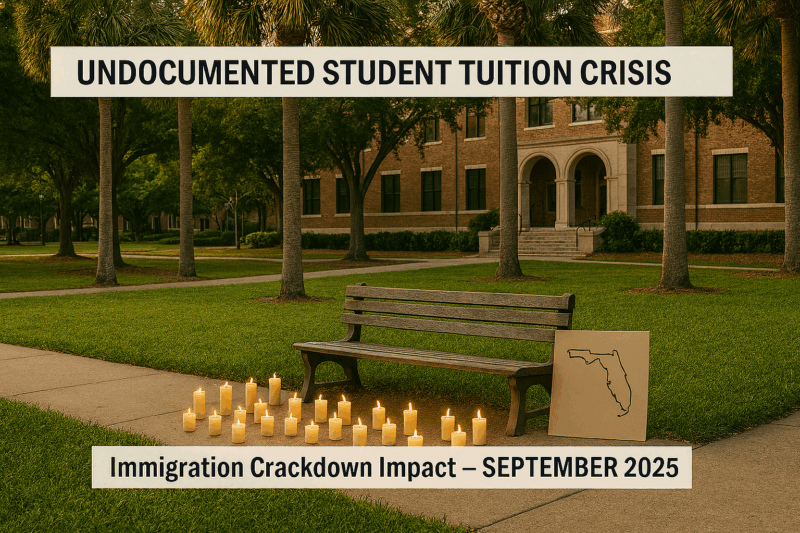Undocumented student tuition challenges are escalating as Florida and Texas revoke in-state tuition benefits amid an immigration crackdown 2025. In Florida, a 2014 law allowing in-state rates was repealed in July, while Texas ended its decades-old policy in June following a federal lawsuit. Students like Carlie, a Haitian immigrant at the University of Central Florida, are dropping out or delaying college due to soaring costs and fears of detention. This shift, driven by President Donald Trump’s administration, threatens college access for thousands, highlighting a growing educational crisis.
Human Toll
The loss of in-state tuition has forced students into tough choices, with many facing student dropout rates. Carlie, now confined to online courses at Purdue Global, fears ICE detention, isolating her from campus life. David, a Honduran high school graduate, abandoned his radiology dreams for a McDonald’s job, unable to afford out-of-state rates. In Florida, over 6,500 students lost the waiver in 2023-2024, while Texas’s 57,000 undocumented students face similar barriers. Advocates note the emotional toll, with students feeling their hard work is erased, deepening community distress.
Facts
Florida’s repeal of the 2014 tuition waiver, signed by Governor Ron DeSantis, ended a benefit allowing undocumented students to pay $6,380 annually at the University of Florida, versus $30,900 for nonresidents. Texas’s Texas Dream Act, blocked by a federal judge, had supported 20,000 students paying $81 million in tuition in 2021. The Justice Department argues these policies violate federal law by favoring undocumented students over out-of-state citizens. Colleges like UCF now partner with ICE for enforcement, pushing students to online learning or withdrawal, with credits often failing to transfer.
Climate Context
The immigration crackdown 2025 reflects a shift in state politics, with Florida’s bipartisan support turning conservative under DeSantis and Texas aligning with Trump’s agenda. Web information shows 23 states still offer in-state tuition, but Florida and Texas’s reversals signal a trend, fueled by Republican critiques of “unfair” benefits. This mirrors broader tensions over sanctuary cities and federal funding cuts, with educators like Rosie Curts in Dallas noting demotivation among students as college access shrinks, amid a polarized national debate on immigration.
What Lies Ahead
The Texas tuition policy change is under appeal, while Florida’s repeal takes full effect. The Trump administration may target more states, with Kentucky, Minnesota, and Oklahoma already facing lawsuits. Colleges could see enrollment drops, impacting $460 million annually in Texas’s economy, per the American Immigration Council. Scholarships for undocumented students are at risk, and students like Carlie may seek online options or drop out. Advocacy groups push for legislative relief, but the 2025 election could intensify the crackdown, altering college access nationwide.
Conclusion
The undocumented student tuition crisis, driven by the immigration crackdown 2025, is derailing dreams in Florida and Texas. The loss of in-state tuition and rising student dropout rates underscore a policy shift that threatens educational equity. As states grapple with federal pressure, the future of college access hangs in balance, urging a reevaluation of how immigration policies impact young lives.






